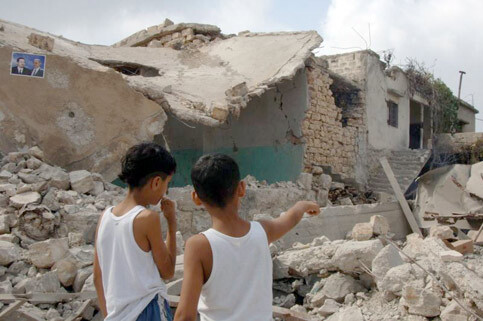IRIN 30 August 2006

Lebanon’s government says the country sustained some US $3.6 billion in material losses. (Dina Debbas/IRIN)
BEIRUT - The Lebanese economy could go into recession in 2006 because of the damage done by the recent Israeli offensive and its ongoing air and naval blockade of the country, Lebanon’s Finance Minister Jihad Azour has warned.
Azour added, however, that there could be a quick economic turn-around should current circumstances improve. “Yes, there is a risk of negative growth but there is also a chance of a recovery in growth if the blockade is lifted quickly,” he said.
However, hopes for an immediate lifting of the blockade were dashed on Wednesday when Israel’s Prime Minister Ehud Olmert rebuffed United Nations Secretary General Kofi Annan’s calls for an end to what he described as a “humiliating” blockade.
In the meantime, there is no agreement by economists and aid agencies on how much Lebanon’s economy has suffered as a result of the war.
The Lebanese Council for Development and Reconstruction (CDR) has said that Lebanon sustained some US $3.6 billion in material losses from Israeli bombings during the conflict.
This includes more than 15,000 destroyed houses and up to 80 severely damaged bridges and roads. CDR’s estimate does not include indirect damage such as lost revenues and stalled foreign investments.
Israel says it was targeting ‘terrorist infrastructure’.
Economist Mazen Soueid said that the Lebanese economy could lose US $9.5 billion in total, or 40 percent of the country’s GDP, as a result of reduced economic activity and the ongoing Israeli blockade.
This loss would include about US $3 billion in tourism receipts, some US $200 million in lost export revenue, as well as about US $700,000 million in lost tax revenue. At best, the country would register zero economic growth instead of the 6 percent growth projected for 2006, said Soueid.
The much higher figure of US $15 billion has been cited by the UN Development Programme (UNDP) for Lebanon’s direct and indirect losses as a result of the conflict.
“The damage is such that the last 15 years of work on reconstruction and rehabilitation, following the previous problems [the 1975-1990 civil war] that Lebanon experienced, are now annihilated,” UNDP spokesperson Jean Fabre said.
Israel says its continued air and sea blockade is aimed at preventing Hezbollah from re-arming, although it has been granting permission to aid-bearing ships to dock at Lebanon’s ports.
The London-based Economist Intelligence Unit warned that Lebanon’s 2006 Gross Domestic Product (GDP) would be about 10 percent less than original projections. This would mean that Lebanon’s national debt of US $38.5 billion would be the equivalent to more than 200 percent of the country’s GDP.
According to Azour, however, “it is too early to say whether [Lebanon’s] GDP would shrink by 10 percent”.
While the airport is set to reopen fully soon, it is not clear how long it will take for the necessary conditions to be in place before Israel lifts its naval blockade. Though UN agencies say that immediate humanitarian needs are generally being met now in Lebanon, a receding economy poses many problems for the long-term health of the country.
“In the larger scheme of the Lebanese economy, humanitarian assistance is a small input and targets the most vulnerable,” said David Shearer, UN Humanitarian Coordinator in Beirut. “Overall, if the naval blockade continues, then the whole of Lebanon becomes more and more vulnerable.”
Related Links